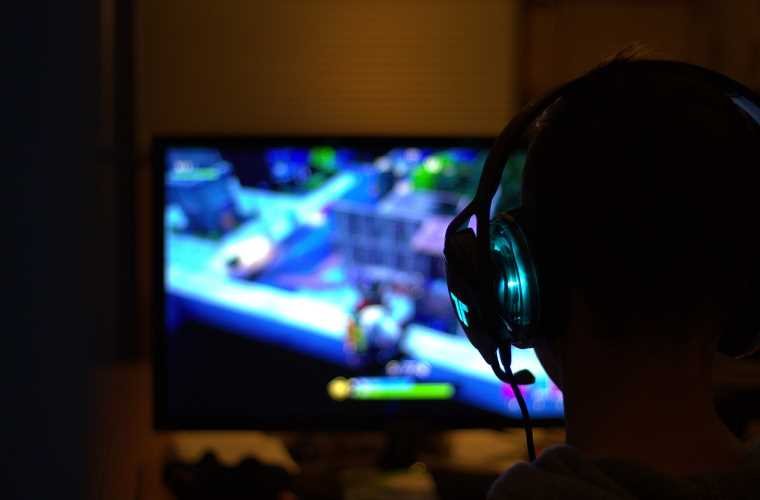A recently published study seems to indicate that children who play more video games become smarter over time. Conversely, social media usage and TV watching had no such effect. Previous studies have returned more dubious results on a possible link between playing video games and intelligence. However, if confirmed by future studies, the observed link may have parents thinking twice about restricting their children’s gaming time.
LOOKING AT THE EFFECTS OF SCREEN TIME ON INTELLIGENCE
“For our study, we were specifically interested in the effect of screen time on intelligence,” wrote two of the study’s authors, Torkel Klingberg and Bruno Sauce, in a story for The Conversation, “the ability to learn effectively, think rationally, understand complex ideas, and adapt to new situations.”
The authors explain that some previous studies had hinted at a possible link between screen time and intelligence. However, none of that previous work employed a very large sample size, adjusted effectively for socioeconomic background, and none of the previous researchers adjusted their results for genetics.
“The novelty of our study is that we took genes and socioeconomic backgrounds into account,” the two researchers explain. “Only a few studies so far have considered socioeconomic status (household income, parental education, and neighbourhood quality), and no study had accounted for genetic effects.”
Published in the journal Scientific Reports, the authors cite a pair of studies showing that intelligence may be “highly heritable” and is, therefore, a critical component to take into account when testing for the effects of screen time on intelligence.
“Genes matter because intelligence is highly heritable,” they write. “If unaccounted for, these factors could mask the true effect of screen time on children’s intelligence. For example, children born with certain genes might be more prone to watch TV and, independently, have learning issues.”
“The lottery of genetics is a major confounder in any psychological process,” the authors add, “but until recently, this has been hard to account for in scientific studies due to the heavy costs of genome analysis and technological limitations.”
Now, they say that circumstances have changed.
VIDEO GAMES ASSOCIATED WITH HIGHER INTELLIGENCE
To conduct their study, the research team selected, interviewed, and tested “more than 5,000 children aged ten to 12.” They also note that “our sample was representative of the US in terms of sex, race, ethnicity and socioeconomic status.”
Next, they constructed a battery of tests designed to measure critical areas of intelligence.
“We created an intelligence index from five tasks:” they write, “two on reading comprehension and vocabulary, one on attention and executive function (which includes working memory, flexible thinking and self-control), one assessing visual-spatial processing (such as rotating objects in your mind), and one on learning ability over multiple trials.”
After interviewing the children about their gaming habits, social media use, and TV watching habits, they were subjected to the prepared intelligence tests.
“We found that when we first asked the child at age ten how much they played, both watching videos and socialising online were linked to below-average intelligence,” the authors write of their initial baseline IQ testing. “Meanwhile, gaming wasn’t linked with intelligence at all.”
They note that these initial results were “mostly in line” with previous research. However, when they followed up with the children 2 years later, they found that “gaming had a positive and meaningful effect on intelligence.”
“While children who played more video games at ten years were on average no more intelligent than children who didn’t game, they showed the most gains in intelligence after two years, in both boys and girls,” the researchers explain. “For example, a child who was in the top 17% in terms of hours spent gaming increased their IQ about 2.5 points more than the average child over two years.”
“This is evidence of a beneficial, causal effect of video games on intelligence,” the study authors add.
The same tests showed that two years later, social media had no effect on intelligence.
More TV watching initially looked like it may be correlated with increased intelligence over the two-year span. But, the researchers say they ultimately found “no effect when parental education was taken into account (as opposed to the broader factor of “socioeconomic status”). So this finding should be taken with a grain of salt.”
PARENTS CAN FEEL BETTER ABOUT KIDS PLAYING VIDEO GAMES
The researchers found that gaming seemed to increase intelligence, but social media use and TV watching had no measurable effect. However, they do note that “there is some empirical support that high-quality TV/video content, such as the programme Sesame Street, has a positive effect on children’s school performance and cognitive abilities.” But, they concede, such results “are rare.”
The most significant takeaway may be that passive activities like reading social media or watching videos may have no overall effect on intelligence, whereas interactive forms of entertainment that often involve problem-solving and memorization may actually be helpful to some degree. Still, the researchers note that their study wasn’t able to account for every possible influence.
“When thinking about the implications of these findings, it is important to keep in mind that there are many other psychological aspects that we didn’t look at, such as mental health, sleep quality, and physical exercise,” they write.
In the end, the study authors offer a word of caution, followed by a little bit of hope.
“Our results should not be taken as a blanket recommendation for all parents to allow limitless gaming,” they conclude. “But for those parents bothered by their children playing video games, you can now feel better knowing that it’s probably making them a tad smarter.”
Follow and Connect with Author Christopher Plain on Twitter @plain_fiction

